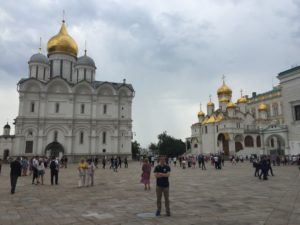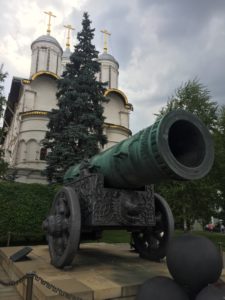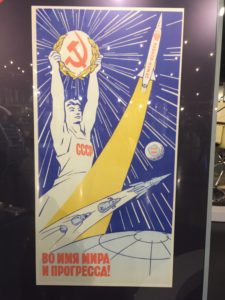Billy Joel sang in 1976 that “I know what I’m needin’, and I don’t want to waste more time”, and nearly six weeks into my summer abroad I have a similar sentiment. Instead of New York, however, I’m in a Moscow state of mind, and I want to make the most of my remaining opportunities to progress in Russian. Between classes, homework, and explorations, the past two weeks have been a whirlwind of activity and learning. Nonetheless, life has seemed normal, giving me confidence that I can succeed in most daily tasks. Hearing and understanding spoken Russian in the classroom is easier and no longer exhausting. Next week will be my final week of classes, and I will post an update about my upcoming adventures for the following two weeks.
Once again, I want to start with another survey of an important cultural and political issue – and no, it’s not the Putin-Trump summit. All of you in the United States can debate that as you wish, but I will say nothing about that here. Instead, one of the hottest issues of the summer here in Russia is the introduction of legislation to raise the pension/retirement age. Currently, Russian women are eligible to receive pensions at 55 while men can receive pensions at 60. Under the new plan, through incremental increases in the age requirements, the new age of eligibility will be 63 for women and 65 for men.
For Russians, this news comes as quite a shock and brings important social consequences. Given that multiple generations of families often live together in one house or apartment, families rely on pension income for extra income. Many believe that current salaries are insufficient to support extra years of work, including a Russian friend of mine who was critical of the proposed reforms. When we talked about the issue yesterday evening, she informed me about the basic workings of the pension system – similar to the United States, citizens pay into the system throughout their working lives but through an automatic tax on purchases. She believes that lower pay combined with more years of paying into the system will strain families’ financial resources.
Furthermore, there are the issues of child care and life expectancy. My host mother and host sister both emphasized the impact on families when we discussed the pension reforms, and they could not believe how Americans do not receive their pensions until their mid-60s. Both of them stated the importance of mothers and grandmothers caring for children, who are often the center of family life. With more years of

work required before receiving pensions, women will have to spend more time away from home and from children, leaving questions as to how to care for them. Their fears make more sense within the context of a strong dependence on the nuclear family, especially on mothers and grandmothers. Additionally, as we discussed, Americans tend to marry later and start families later these days than Russians.
Finally, life expectancy – especially for men – is lower here than in the United States: according to data from 2017, women can expect to live to about 77, which is similar to figures for American women. However, Russian men have an average life expectancy of only 66.5 years. As a result of the new reforms, some Russians are afraid that they will barely live to see their pensions. All of these factors have created significant opposition to the reforms, exemplified by demonstrations in cities across the country this week. Just as in the United States, Russia faces an issue of how to properly care for aging citizens while managing spending.
Nonetheless, I still want to point out some highlights from the past 10 days and a look at things to come.
- Moscow Kremlin (Московский кремль): This past weekend, I was finally able to purchase a ticket to explore the churches

The Tsar’s Cannon, Moscow Kremlin. Constructed in 1586 but never fired a shot. Also, the cannonballs do not fit in the cannon properly. and territory of the Moscow Kremlin. Though the weather was not terribly cooperative, I was thrilled to see the interiors of churches such as the Assumption Cathedral (Успенский собор, 1475-79, the site of the coronations of the Russian Tsars), and Archangel Cathedral (Архангельский собор, 1505-08, burial place of Grand Princes and Tsars up to Peter I The Great). The artwork and icons on display in these churches were often several hundred years old, including a famous icon of Christ dating to the early 12th century. Успенский собор is quite possibly the most beautiful church I have ever seen, as the walls are filled with icons and scenes of early Russian history. The Moscow Kremlin is full of history, and before I leave I hope to see the Armoury Museum – the site of hundreds of Tsarist artifacts and priceless treasures.
- Cosmonaut Museum (Музей космонавтики): For those of you who don’t know, I had a fascination with space in my childhood that still manifests

“In the name of peace and progress”, Cosmonaut Museum. itself in a genuine appreciation of space exploration. As a result, I was excited to have the chance to explore the Cosmonaut Museum in the city, which is the equivalent of our Smithsonian Air and Space Museum. Inside were various reconstructions of rockets and the original rocket head used to send the two Soviet dogs, named Strelka and Belka, to space. Interestingly enough, I also thoroughly enjoyed Soviet propaganda posters encouraging space exploration.
- Conversation and Learning: Most of my past two weeks has been me focusing on learning vocabulary, completing assignments, and practicing speaking. Given everything to do here, the tasks before me have seemed intimidating at times. However, I believe the work is starting to pay off – my host family last week complimented me on the fact that my speaking ability is “much better” from when I first arrived. Additionally, my conversation partner told me that I was understandable and that her corrections were simply some grammatical and technical ones. I still make plenty of mistakes, but total breakdowns in communication by this point are becoming increasingly rare. I want to improve even more in the next three weeks, but I am proud of what I have done so far.
This weekend will be full of excursions and adventure – our group will visit Tolstoy’s estate in Tula tomorrow and Sergiev Posad (a Russian Orthodox monastery) on Sunday. Additionally, some of my friends and I will travel to Vladimir, an ancient Russian city about 100 miles northeast of Moscow, on Saturday. More to come next week regarding those travels and other updates.
If you’re still here, thanks for reading this far and supporting my journey! I love that you take the time to read about Russian culture and every day life. I can only hope that this blog has helped you to understand and appreciate the Moscow State of Mind.